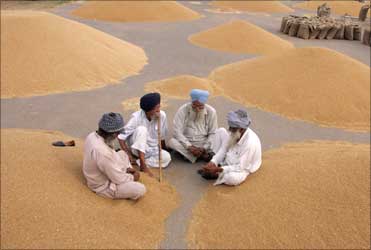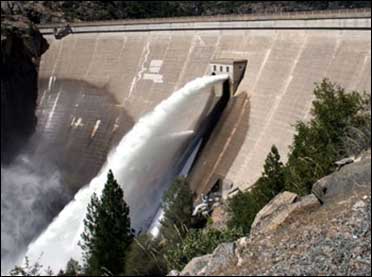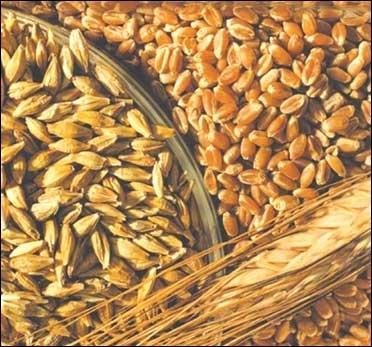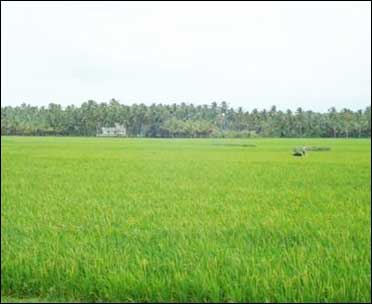 | « Back to article | Print this article |
Surplus food, yet lakhs of Indians go hungry
The current mood in the various Bhavans around Raisina Hill is a little different from the general gloominess that marks the conversation of most residents of New Delhi.
Talk to anyone living in India's Capital city, the topic of discussion will invariably be either the threat of floods from incessant rains and the release of water from reservoirs in Haryana into the Yamuna or the deteriorating traffic problems as a result of the mismanaged construction of various projects for the Commonwealth Games.
In sharp contrast, there is a general sense of relief and satisfaction evident on the faces of most senior central government officials.
Click NEXT to read on...
Surplus food, yet lakhs of Indians go hungry
This has obvious implications for inflation, which has been giving North Block officials many a sleepless night for several months.
The problem of distribution of foodgrain to the needy will persist, but sentiments will remain benign and not add pressure to prices.
Even otherwise, North Block has delivered the much-delayed direct taxes code. The goods and services tax regime, too, may be in place later next year.
Click NEXT to read on...
Surplus food, yet lakhs of Indians go hungry
It is a different matter that experts are questioning the authenticity of the data and are wondering how long it will take for the government to announce a revision in the July data - just like it did for the June figures a few days ago.
Commerce ministry officials, who sit in the other corner of Udyog Bhavan, do not look as upbeat on export prospects in the remaining months of the year, but draw satisfaction from what their colleagues in the finance ministry have done for them through the introduction of a Bill on the direct taxes code.
Click NEXT to read on...
Surplus food, yet lakhs of Indians go hungry
In Shram Shakti Bhavan too, power ministry officials have welcomed the rains, which apart from reducing the demand for power in the current month have also improved the prospects of higher electricity generation from hydroelectric power projects.
The availability of water in the country's 81 major reservoirs until last week has risen to 103 billion cubic metres - 32 per cent more than what was available last year at this time and 11 per cent more than the normal level.
Click NEXT to read on...
Surplus food, yet lakhs of Indians go hungry
Although this might force some of the reservoirs to release excess water, causing floods in some areas, the good news for power ministry officials is that hydroelectric power generation this year would increase and power deficit would certainly see a sharp drop.
Also, the acreage of crops this year has seen a major increase, cheering officials in Krishi Bhavan, headquarters of the agriculture ministry.
The total area brought under kharif crops this season so far is 99 million hectares, over 7 per cent more than last year's acreage. More interestingly, the land under pulses has gone up to 11 million hectares, 22 per cent from last year, and the land under cotton is over 10.6 million hectares, a marginal increase of 8 per cent.
The point to be noted is that farmers have positively responded to price signals. They are growing more for crops that should fetch them higher prices. The agriculture ministry should naturally be pleased with this subtle shift in the Indian farmers' approach to farming.
Click NEXT to read on...
Surplus food, yet lakhs of Indians go hungry
It is a problem of plenty for the department. Total foodgrain stocks with the government are now over 60 million tonnes, almost three times more than the level stipulated under the government policy on maintaining a buffer stock to meet its requirements for feeding the public distribution system, ensuring food security and stabilising prices through open market sales.
Even when compared with the strategic reserve requirements, the current food stocks are 180 per cent higher.
Click NEXT to read on
Surplus food, yet lakhs of Indians go hungry
Since its godowns are full and the new storage capacity will take a couple of more years to ease the shortage, the Food Corporation of India, the government's principal food procurement agency, would be reluctant to enter the market.
If it does not enter the market to procure the kharif food crop, there is a strong possibility that farmers may suffer because of a fall in prices.
The food department's dilemmas if not resolved quickly can lead to a serious problem. The government must intervene and take necessary steps by either allowing food grain exports or creating more capacity for storing the procured grains. A government that swears by the aam aadmi cannot be seen as doing nothing while farmers get ruined after a bumper crop.







